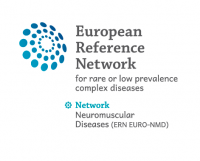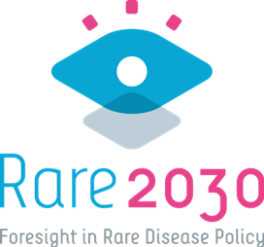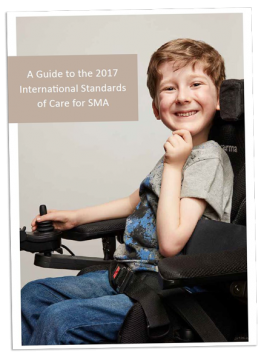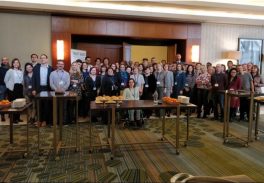|
| |
Recent audit of EU cross-border healthcare directive acknowledges challenges facing ERNs
The 2011 EU cross-border healthcare directive is aimed at ensuring safe and high-quality medical care across borders in the EU, as well as providing for reimbursement abroad under the same conditions as at home.
In November 2018, auditors examined whether the European Commission has monitored the implementation of the EU cross-border healthcare directive and supported Member States in informing patients of their rights. They assessed the results achieved on exchanges of health data across borders and checked key actions on rare diseases.
The auditors stated that the European Reference Networks for rare diseases are an ambitious innovation and are widely supported by doctors, healthcare providers and patients. Despite the fact that a total of between 27 and 36 million people suffer from rare diseases in the EU, the networks face significant challenges to ensure they are financially sustainable and able to operate effectively across national healthcare systems.
The full press release about this audit can be accessed on the EU Commission's website.
|
|
|
|
| |
Quality assurance, variant interpretation and data management in the NGS diagnostics era
This first 3-day residential training course on “Quality assurance, variant interpretation and data management in the NGS diagnostic era” will host 20 participants.
The course will build on expertise gained by EuroGentest and help in the translation of research tools to diagnostic applications (in line with the IRDiRC objectives). The impact is on the quality and reliability of NGS results, obtained through rare disease research. This is an annual course for scientists, bio-informaticians and clinicians with an interest in genomic technologies. The aim is to teach participants about the evaluation of the pathogenic nature and clinical significance of genetic variants, on the criteria that have to be set to the NGS analysis pipelines and on the use of international databases. Further information and registration
Application deadline 31 July 2019
|
|
|
|
|
| |
Rare 2030 seeks to shape future policies for rare diseases across the next decade and beyond
|
|
|
|
|
| |
Updated Care Guide for Spinal Muscular Atrophy - now available!!
The updated Spinal muscular atrophy (SMA) care guide for families and their doctors is now available to download in a number of different languages from the TREAT-NMD website. The new guide is based on the information available in the latest academic articles published in 2017. Initially, this latest version of the guidelines for the care of SMA is only available in English, however this guide is being translated and as they are completed will be also be available to download.
|
|
|
|
|
| |
EURO-NMD represented at European Academy of Neurology Congress
EURO-NMD shared a promotional booth with fellow ERN network, ERN-RND at the 5th Congress of the European Academy of Neurology in Oslo. Our network representatives attending the booth were EURO-NMD Project Manager Heike Pascal and CPMS Helpdesk Assistant Chloe Blewitt.
Many of our network partners who attended the congress and visited the booth. Here they took the opportunity to talk to Chloe about the latest updates to the Clinical Patient Management System (CPMS), have their questions answered and receive one-to-one help with the different aspects of the system.
We were so delighted with the positive response from our network partners that we would like to provide a similar opportunity to those of you who will be attending the upcoming board meeting in Paris on 19th July. Look out for Chloe and her laptop, she will be happy to try and help with all things CPMS.
|
|
|
|
|
| |
Expert Masterclass in Spinal Muscular Atrophy
Applications are now open! TREAT-NMD is now accepting applications for the 2nd masterclass in spinal muscular atrophy (SMA). It will take place at the Royal Society of Medicine, London, UK on Tuesday 29th and Wednesday 30th October 2019. The masterclass is suitable for healthcare professionals and researchers who are involved in SMA care and research. Travel and accommodation should be arranged independently and places are highly competitive so it is important to apply early. Places will be allocated based on how applicants' attendance will have the widest benefit to the SMA patient community and will be decided on by the TREAT-NMD Education Committee (TEC). You will be asked to explain how the masterclass will benefit your work as part of the application process. If you have any questions please contact the SMA Education Co-ordinator Nicole O’Connor at the John Walton Muscular Dystrophy Research Centre, Newcastle University, UK: nicole.oconnor@ncl.ac.uk
Closing date for applications is 9th August 2019 All delegates who attended last year’s masterclass said they would recommend it to a colleague.
|
|
|
|
|
| |
International Conference on Imaging in Neuromuscular Disease 2019 - abstract deadline extended to 30 June!
The second International Conference on Imaging in Neuromuscular Disease will be held at the Langenbeck-Virchow-Haus in Berlin from 17-19 November 2019. The conference will feature internationally recognized speakers including Pierre Carlier, Andrew Blamire, Pierre Yves Baudin, Julien Valette, Daniel Ennis, Olivier Scheidegger, Bram van Ginneken, Jennifer Kollmer and Peter Caravan. The programme will include sessions on new imaging applications in NMD, diffusion imaging, imaging cardiac muscle, deep learning and MR neurography. Young researchers and trainees are encouraged to attend and participate. Selected abstracts will be featured for platform presentation during the sessions and all posters are eligible for poster awards. The deadline for abstract submission has now been extended to 30th June 2019. Registration for this conference is now open and an early bird rate is available until 1st August 2019. Please visit the dedicated conference website for more information. For sponsorship opportunities please contact Helen Sutherland: helen.sutherland@newcastle.ac.uk
Please note: This conference has been endorsed by the International Society for Magnetic Resonance in Medicine.
|
|
|
|
|
| |
European Joint Programme on Rare Diseases - WP17 Focus group meeting
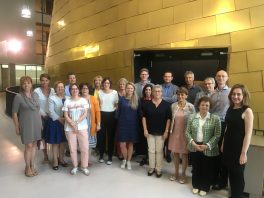
| |
The European Joint Programme on Rare Diseases (EJP-RD) brings over 130 institutions from 35 countries: 27 EU Member States to create a comprehensive, sustainable ecosystem allowing a virtuous circle between research, care and medical innovation.
Rare Disease research should be improved to overcome fragmentation, leading to efficacious use of data and resources, faster scientific progress and competitiveness, and most importantly to decrease unnecessary hardship and prolonged suffering of RD patients.
To achieve this goal, the European Joint Programme on RD (EJP RD) has two major objectives:
(i) To improve the integration, the efficacy, the production and the social impact of research on RD through the development, demonstration and promotion of Europe/world-wide sharing of research and clinical data, materials, processes, knowledge and know-how;
(ii) To implement and further develop an efficient model of financial support for all types of research on RD (fundamental, clinical, epidemiological, social, economic, health service) coupled with accelerated exploitation of research results for benefit of patients.
To begin addressing these two main objectives 20 ERN representatives of 15 different ERNs met in Leiden, NL on Wednesday 26 June to focus on workshops and fellowship training exchange programs for ERN researchers, under this EJP-RD program. Programs will begin in late 2019 and information about them will be disseminated via our normal channels when available.
The focus group meeting was kindly hosted by Endo-ERN.
|
|
|
|
|
